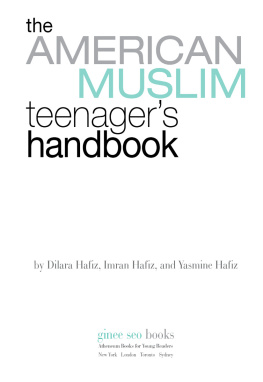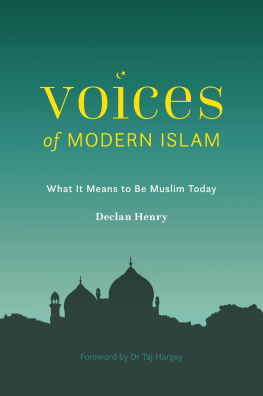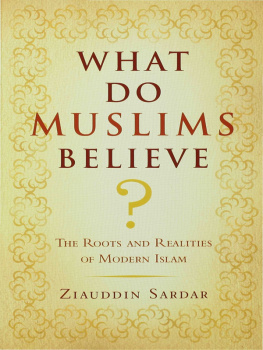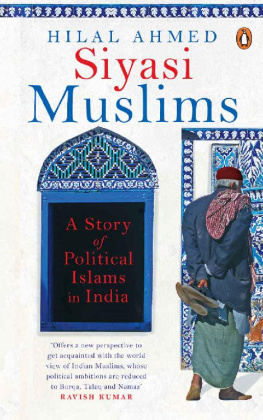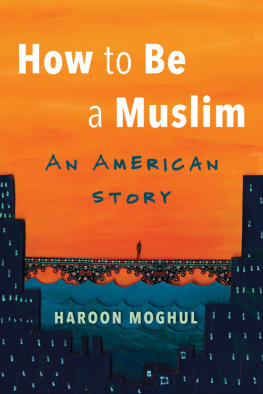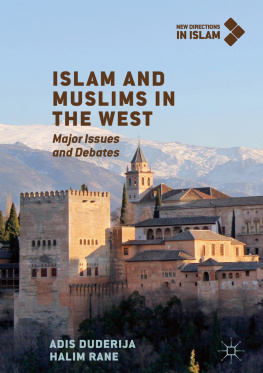
Acknowledgments
Wed like to thank the many people who have encouraged us along this journey, especially Imam Subahudin Ceman, for his thoughtful perspectives; Sister Muna Ali, for invaluable corrections; Rabbi Charles Herring, for insight into the Jewish faith; and the numerous teens who participated in the survey. Thank you to Asma Gull Hasan and Dr. Jeffrey Lang for their wholehearted belief in this book and their guidance to American Muslims. Thanks to Ginee Seo and Anne Zafian, for believing in this book and for bringing it to the larger publishing world; Jeannie Ng, for her eagle eyes; Deb Sfetsios, for her beautiful designs; and the rest of the publishing team at Atheneum/Simon & Schuster, for their invaluable support.
Wed especially like to thank Hamid Hafiz, ideal husband and understanding father, for his patience and full-fledged support throughout this project. Most importantly, wed like to acknowledge our parents and grandparents: Col. M.A.R. Ibn Hafiz and Begum Safia Hafiz and Mr. and Mrs. Bashir and Yvonne Karamali. They epitomize the essence of living a spiritual life and they continue to be stellar examples of the kindness, love, and open-mindedness that unite all faiths as one.
Needless to say, all the opinions expressed in this book, whether by the authors, the teens via the questionnaire, or anonymously, are no reflection upon any of the people or institutions whose names appear within these pages. We take sole responsibility for any errors or misunderstandings we may have inadvertently made.
Afterword
The most rewarding result of writing The American Muslim Teenagers Handbook has been the incredible and quite unexpected out-pouring of support from Americans of different religions, ethnicities, cultures, and ages. Complete strangers have approached us following book signings or presentations to shake our hands and thank us for dispelling so many of their stereotypes about Muslims, stereotypes that they often didnt even realize they were holding. The level of enthusiasm and thirst for knowledge about Islam from the novel perspective of American Muslim teenagers has been truly unbelievable, and we remain genuinely humbled by this response.
I wish this book had been around when I was a teenager is the most frequent comment voiced by Muslim adults. Our faith could use a book like this is the praise from priests and rabbis. Will you be writing a sequel? is a compliment that we are seriously considering. My youth group/Scout troop/book club would love to use this book! is the feedback that validates the use of this book as a resource on Islam. We include these comments in order to highlight the diverse reception to The American Muslim Teenagers Handbook , depending upon ones frame of reference. Have we received any criticism? Where religion is concerned, people with differing cultural and spiritual traditions are bound to disagree over issues of interpretation, but these objections are rooted more in form rather than substance. In our opinion, the few critics who disagree with our expansive view of Islam are focusing on the minutiae of religious doctrine rather than the intentions behind this book: to help dispel misconceptions about Islam in an empowering, educational, and entertaining manner. Dialogue within the family, within the Muslim community, and between Muslims and non-Muslims are the desired outcome of this book. If weve been able to help just one person walk away with a more beneficial understanding of Islam and its place among the worlds religions after theyve finished reading this, then we feel weve accomplished our dreams. (Okay, peace on Earth is still one of our dreams, too.)
Writing a book about religion isnt easy. When we undertook this project, perhaps we overestimated our ability as well as underestimated the task, but were glad we persevered. Deciding upon the topics to include in this book necessitated many late-night discussions about the importance and relevance of each chapter. Ultimately we settled upon covering the basics of Islam as practiced by the moderate majority of American Muslims. Cultural nuances are mentioned wherever possible, but, of course, the diversity within the Muslim world is reflected by the diversity of practice, differing levels of adherence to orthodoxy, and differences in interpretation. Teen-specific topics merited their own chapters, but could have been expanded into books in their own right as theres just so much to include in order to honestly depict the variety of teen experiences.
Whenever the issues became too serious, we made sure to insert a laugh or two. After all, everyone has a sense of humor, even Muslims! So whether you picked up this book out of idle curiosity or were required to read it as part of a school assignment, we hope its been an easy and enjoyable read. In the final analysis, exploring issues of religion remains an intensely personal journey. In an ideal world, this journey should be traveled without fear of prejudice or ridicule from the unduly harsh judgment of others, and we thank you for allowing us to share our journey with you.
Dilara, Yasmine, and Imran Hafiz
Glossary
(What do These Words Mean Again?)
Allah : Arabic word for God; the one God; the God of Moses, Abraham, Jesus, and Muhammad; the same God which Jews, Christians, and Muslims refer to when they say God. Seriously, it just means God.
Bismillah : Means in the name of God, a common term used as a blessing or invocation, i.e., before a meal, before beginning a test, or before a journey.
dua : Arabic word for prayer, commonly used to refer to any additional, voluntary prayer that can be offered at any time of the day or night, in any language, anywhere, and in any manner.
Eid : A festival, holiday. There are two Eid holidays (Eid al-Fitr and Eid al-Adha). Yeppresents twice a year!
fast : To abstain from food and beverages, from sunrise to sunset, specifically during RamadanYeah, its not easy, but youll survive.
Five Pillars of Islam : The declaration of faith, prayer, charity, fasting, and pilgrimage to Mecca.
Friday : Umm, its a day of the weekIt comes after Thursday. Also the Muslim day of congregational prayer (like the importance of Saturday for Jews or Sunday for Christians).
Hajj : The pilgrimage to Mecca, Saudi Arabia. Its a journey that most Muslims hope to make at least once in their lives, if they are financially and physically able.
Hadith : The sayings of Prophet Muhammad.
halal : Things that are allowed, according to the Quran (anything that isnt specifically forbidden is technically allowedthat includes iPods!); often used to refer to food or activities.
haram : Things that are forbidden, according to the Quran (basically anything bad for you, physically or spirituallythe obvious ones being drinking, doing drugs, murder, stealing, lying, etc.); often used to refer to food or activities.
hijab : Literally, a partition or separation. Often used as a reference to a womans head scarf/full-body covering. Observance depends upon Quranic interpretation and cultural background.
iftar : Also known as Finally, we can eat!; the traditional name for the meal that is enjoyed after sunset, after a day of fasting during the month of Ramadan. Is it iftar time yet? is the most common phrase heard in Muslim households around the world during the minutes leading up to the iftar .
Jalsah : One of the prayer postures; also known as the sitting.
Kaabah : A cube-shaped building in Mecca, Saudi Arabia, and the most holy building for Muslims due to what it represents: the first building on Earth that was dedicated solely for the worship of God. Built by Abraham and his son Ishmael, it is believed that the foundations were laid by Adam (yes, the Adam from Adam and Eve). Muslims do not worship the Kaabah, however, they do pray toward it, as a gesture of unity during prayer, in obedience to Gods instructions.

